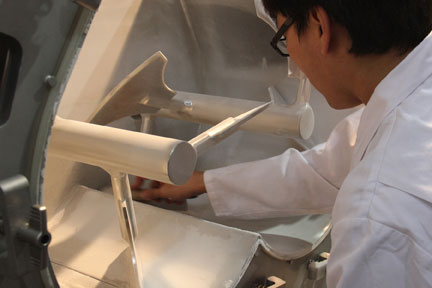
How to avoid over-specifying mixers
By Food in Canada staff
Food Safety equipment Processing Gericke USA Mixers
Engineers processing powders and other bulk materials today face significant safety and hygiene challenges in their plants from the risk of combustible dust explosions and product contamination to keeping workers safe from injury and productive amid coronavirus fears. Add the threat of enforcement action by health and food safety inspectors, and it becomes easy to understand why companies may be over-spending to achieve a perceived level of hygiene that may be quite unnecessary.
Some engineers are purchasing mixers, blenders and other equipment with optional extras to guard against current and future unknowns, according to Rene Meira Medina, executive vice-president of Gericke USA, Somerset, N.J. Medina offers the following considerations for assessing whether investing in an extra level of safety or contamination prevention makes sense or is over-specifying.

Rene Meira Medina
ATEX certification
ATEX is becoming widely recognized in North America as a useful symbol representing explosion prevention and protection. A requirement in the EU, ATEX covers equipment and protective systems for use in potentially explosive atmospheres. Anyone mixing powders works in a potentially explosive atmosphere. This assurance of enhanced safety is tempting processors who are not operating in hazardous environments to purchase ATEX-certified mixers. For these situations, investing in ATEX-certified mixers is over-specifying.
FDA/USDA approval
Mixers for sanitary processing typically include stainless steel, continuously welded seems and polished internals to prevent bacterial growth, plus design consideration to minimize fasteners and allow easy access for cleaning and inspection. But are companies working with cement, fly ash, glass and other materials not typically associated with sanitary processing right to investigate FDA- and/or USDA-approved mixing equipment? Yes! Advantages such as fast cleaning and changeovers and easier maintenance often make the extra investment in sanitary mixers worthwhile.
Future growth
Purchasing extra mixing capacity today to accommodate spikes in demand, projected future growth or recipe changes is a risky endeavour. Growth, once realized, may demand an even larger capacity mixer than purchased, and then, equipment upstream and downstream will also likely need increased capacity. Since it often costs less to purchase an entirely new processing line than to upgrade an existing one, and given the unpredictable nature of processing today, consider buying extra mixing capacity as over-specifying.
Over-specifying a mixer purchase is a costly approach to safeguarding against the risks of operating in today’s business environment. It’s typically far more useful to purchase exactly the right mixer required for the product in production today than to over-spend on extras that may or may never be needed.
Print this page